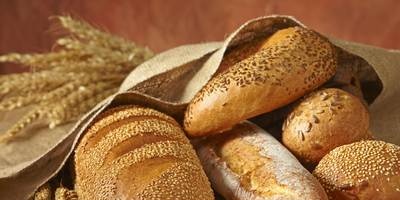|
 Fragrant, fluffy, still very warm, with a crispy crust ... Ordinary bread can become a gastronomic masterpiece, because mankind has been working on improving its recipe throughout its entire existence. Grains and bread have existed alongside mankind since the beginning of its history: archaeological finds indicate that 15 thousand years ago, people used raw grains, then learned to cook them.
Then they ground the grains between the stones - and a very coarse flour, a cross between porridge and bread. Once this substance poured onto stones near the fire, and after that the world's first loaf was born. Fragrant, fluffy, still very warm, with a crispy crust ... Ordinary bread can become a gastronomic masterpiece, because mankind has been working on improving its recipe throughout its entire existence. Grains and bread have existed alongside mankind since the beginning of its history: archaeological finds indicate that 15 thousand years ago, people used raw grains, then learned to cook them.
Then they ground the grains between the stones - and a very coarse flour, a cross between porridge and bread. Once this substance poured onto stones near the fire, and after that the world's first loaf was born.
When scientists find ancient settlements, they ask questions: did the owners of this city have writing, running water and other signs of a developed civilization. And although bakery scientists were indirectly included in this list of interests, the finding of their remains testifies to the development of the studied society. For example, the Trypillian culture was based precisely on clay, clay products and bakery. They also knew how to make bread in Mesopotamia, and in Egypt, and in the ancient state of Urartu.
The word "baker”Appears in the oldest written monuments, and in ancient Rome a slave who knew how to work with dough was 3-4 times more expensive than any other servile.
In the Middle Ages, bakers were also valued because their work was important not only to save people from starvation, but also to keep cities safe. To bake bread, special ovens and a large amount of firewood were needed - so doing this business was dangerous and expensive. Each morning, the hostesses went with their own raw loaves to the bakers across the city to pick up their freshly baked bread... Then the tradition arose to make marks on the loaves - crosses, birds - so that later they would not be confused with other people's loaves.
 Of course, each housewife had several family recipes, and bakers had even more. However, it so happened that, for example, in Western Europe they preferred white wheat bread, and in Eastern Europe they baked rye "sour" bread dark in color, and in the kitchens of the Far East, simple cakes like lavash. Of course, each housewife had several family recipes, and bakers had even more. However, it so happened that, for example, in Western Europe they preferred white wheat bread, and in Eastern Europe they baked rye "sour" bread dark in color, and in the kitchens of the Far East, simple cakes like lavash.
This fundamental difference in tastes once became one of the reasons for the schism of the Christian Church: in the 11th century, a discussion began about the sacrament of the sacrament - the Eucharist: is it possible to use leavened bread during the action, as was done in Byzantium and in Russia, or only unleavened bread, which is still used in the Catholic Church. Byzantium was forced to oppose the prohibition of the pope, so as not to lose the support of the strong Russian state because of bread.
In addition to rye bread, holiday breads were also baked in our country: Easter cakes and rolls, as well as pies with various fillings, which were "cakes and cakes»Our ancestors. It is interesting that in the XVI-XVII centuries in the Slavic cities a significant part of the artisan people were precisely bakers, who, according to their specialization, were divided into bread bakers, kalachniks, pies, rumpers, rams, pancakes and gingerbread.
At that time in Europe, high closed pies were in demand, in which there was more toppings than the dough itself, which served only as a "package" or "form" - this is how various recipes for meat pies and fish in dough... Western European bakers also had specializations: confectioners who made pies, cakes, tartlets, various types of cookies, and the actual bakers who baked baguettes, ciabatta and croissants.
At the same time, the culture of bakeries and pies was formed, which almost disappeared in our country in Soviet times. However, interest in bread increased again: firstly, thanks to the development yeast fermentation process, secondly, as a result of the emergence of convenient and easy to use homemade bread makers.
Baking bread is a delicate and delicate matter, in which it is necessary to verify all the ingredients with almost apothecary precision so that the loaf comes out fragrant and with a perfect crust. By the way, exactly the smell of fresh bread is one of the most effective aphrodisiacs: it reminds of childhood and subconsciously informs about the safety of the place. Thus, it helps to relax and trust, because the instincts developed over millennia say: "Where it smells of bread is safe." That is why, probably, we are so drawn to bakeries, where it breathes home comfort, multiplied by the smell of freshly baked bread.
Vladislav Alexandrovich
|